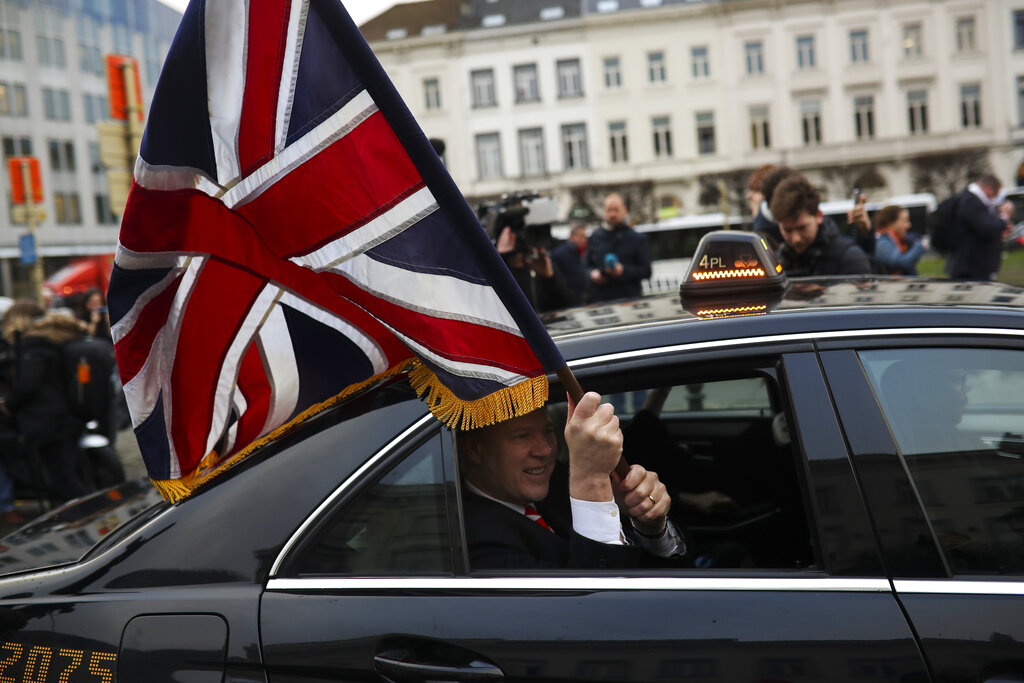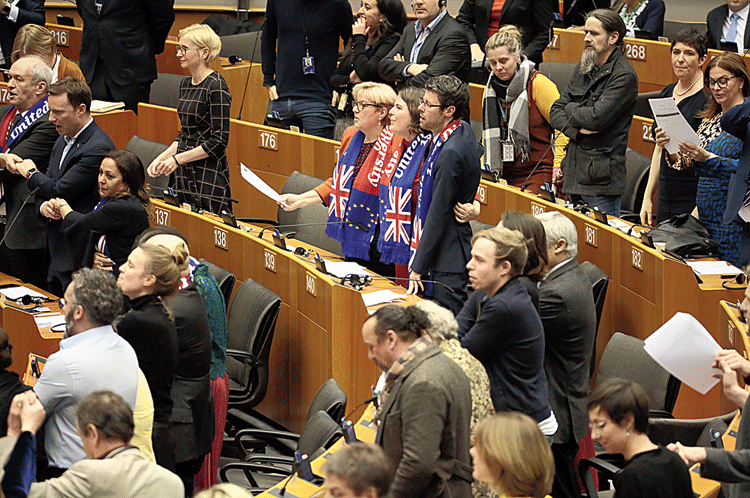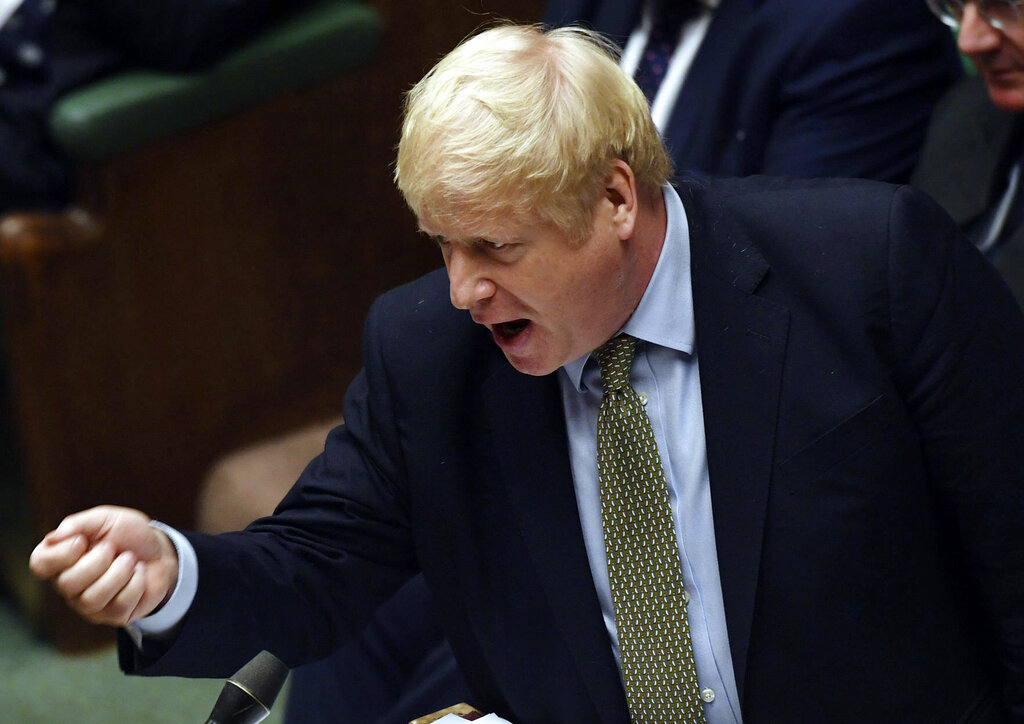Britain begins the day as a member of the European Union. Its status at the end of the day — as a proud nation that has reclaimed its sovereignty, or a diminished presence in Europe and the world — will still be up for debate.
Britain officially departs the EU at 11pm local time Friday, midnight in Brussels (2300 GMT, 6pm EST). The departure comes three-and-a-half years after the country voted by a margin of 52%-48% to walk away from the club that it had joined in 1973.
It's the first time a country has left the EU, and many in the bloc regard it as a sad day. In Brussels, European Council president Charles Michel and EU Commission leader Ursula von der Leyen are due to sketch out the EU's first steps as a group of 27, rather than 28.
UK Prime Minister Boris Johnson is to meet in the morning with his Cabinet in the pro-Brexit town of Sunderland, in northeast England. He is scheduled to deliver a televised address to the country an hour before departure, calling Brexit 'not an end but a beginning.'
According to his office, he will describe it as 'a moment of real national renewal and change.'
The government hopes the moment will be marked in a dignified, nontriumphalist fashion, with red, white and blue lights illuminating government buildings and a countdown clock projected onto the prime minister's 10 Downing St. residence.
Some Brexit supporters will be holding more raucous celebrations. Arch-Brexiteer Nigel Farage and his band of devotees will gather for patriotic songs and speeches in London's Parliament Square to mark a moment that even Farage sometimes doubted would ever come.
Others do not feel like indulging in any festivities. Lawyer Alice Cole-Roberts said Friday morning she expects 'more and more frustration' as Brexit unfolds.
'It's a very sad day,' she said. 'I'm very upset that we are leaving the European Union and I simply wish it didn't happen.'
Britain was never a wholehearted EU member, but actually leaving the bloc was long considered a fringe idea. It gradually gained strength within the Conservative Party, which has a wing of fierce 'euroskeptics' — opponents of EU membership. Former Prime Minister David Cameron eventually agreed to hold a referendum, saying he wanted to settle the issue once and for all.
It hasn't worked out that way. Since the 2016 vote, the UK has held fractious negotiations with the EU that finally, late last year, secured a deal on divorce terms. But Britain is leaving the bloc arguably as divided as it was on referendum day.
By and large, Britain's big cities voted to stay in the EU, while small towns voted to leave. England and Wales backed Brexit, while Northern Ireland and Scotland voted to remain.
In Edinburgh, the EU flag will not be lowered outside the Scottish Parliament on Friday night. Lawmakers there voted to keep it as a symbol of their opposition to Brexit. Scotland's pro-EU government will also light up two government buildings in the blue and yellow of the EU flag on Friday.
Scottish Brexit secretary Mike Russell urged the EU to 'leave a light on for Scotland' so that it could eventually return. The governing Scottish National Party wants Scotland to become an independent EU member country, separate from the U.K.
'It is a stark fact that tomorrow we leave, dragged out against our will, despite the clear instruction of the Scottish people,' Russell said Thursday.
London, which is home to more than 1 million EU citizens, also voted by a wide margin to stay in the bloc. Mayor Sadiq Khan, who has linked the Brexit vote to a rise in xenophobic abuse, said Britain's capital would remain 'a truly global, European city.'
'We continue to be a beacon for progressive ideas, for liberal values and for decency and diversity,' Khan said in a statement. 'And we will continue to welcome people from around the world, regardless of the color of their skin, the color of their passport or the colors of their national flag.'
Britain's departure is a historic moment, but it only marks the end of the first stage of the Brexit saga. When Britons wake up on Saturday, they will notice very little change. The UK and the EU have given themselves an 11 month 'transition period' -- in which the UK will continue to follow the bloc's rules -- to strike new agreements on trade, security and a host of other areas.
Negotiations are due to start in March, and the early signs are not encouraging. Britain says it will not agree to follow an EU rule book in return for unfettered trade. The bloc insists there can be no trade deal unless Britain agrees to a 'level playing field' and does not undercut EU regulations.
Johnson's government hopes to negotiate a deal with the EU alongside a free trade agreement with the United States. That's also likely to be contentious. Opposition politicians are already raising concerns about issues ranging from food-safety standards - especially the US practice of chlorine-washing chicken to kill germs - to drug prices.
US secretary of state Mike Pompeo, who met Johnson in London on Thursday, said the US would put Britain 'at the front of the line' in its trade relationships after Brexit.












